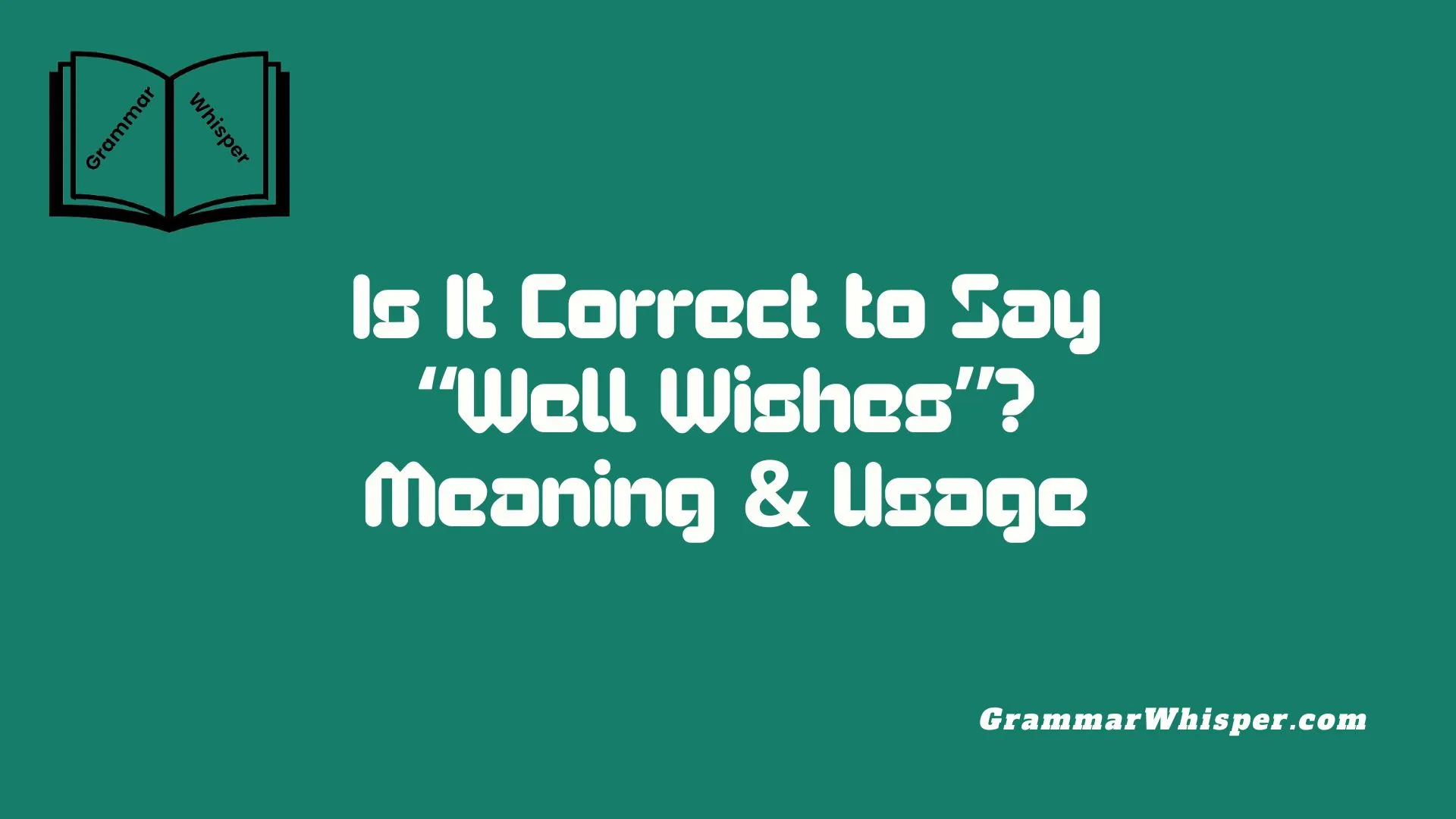The phrase well wishes is straightforward and often used to express goodwill and positivity. When sending Well Wishes your way, you share hopes for health and happiness. This simple phrase mixes warm desires with kindness and is commonly found in cards, messages, or conversations where people want to offer care and support.
Still, questions about the grammatical structure and functioning of well wishes sometimes arise. Is it correctly used in different contexts? To answer this, it helps to explore the history and usage of the phrase. Understanding how to use well wishes properly makes your communication clear, heartfelt, and free from confusion.
The History and Etymology of “Well Wishes”
The term “well-wish” dates back to the late 1500s. According to the Oxford English Dictionary, the earliest known use of “well-wish” as a noun occurred in 1595. It was used to denote a favorable or benevolent desire. The compound “well-wisher,” meaning someone who expresses such desires, also emerged around this time.
Over the centuries, “well-wish” and its derivatives have appeared in various literary and colloquial contexts. While not as prevalent as “best wishes,” the term has maintained a presence in the English language.
Comparing “Well Wishes” with “Good Wishes” and “Best Wishes”
To understand the nuances of “well wishes,” it’s helpful to compare them with similar expressions:
| Phrase | Common Usage Contexts | Grammatical Structure | Notes |
| Best wishes | Formal correspondence, cards | Adjective + noun | Most widely accepted and used |
| Good wishes | Informal messages | Adjective + noun | Less common but grammatically correct |
| Well wishes | Informal contexts | Adverb + noun | Less conventional; usage debated |
The key difference lies in the grammatical structure. “Best” and “good” are adjectives modifying the noun “wishes,” making them grammatically sound. “Well,” however, is primarily an adverb, which typically modifies verbs, adjectives, or other adverbs, not nouns. This discrepancy raises questions about the correctness of “well wishes.”
The Adverbial Use of “Well” in Historical Contexts
Historically, “well” has been used as both an adverb and an adjective, though its adjectival use is less common. In phrases like “I wish you well,” “well” functions as an adverb modifying the verb “wish.” However, when used in “well wishes,” “well” appears to modify the noun “wishes,” which is atypical for an adverb.
This unconventional usage has led some linguists and grammarians to view “well wishes” as a nonstandard or colloquial expression. While it’s understood and used in informal contexts, it may not align with strict grammatical rules.
The Appropriate Use of “Well Wishes” in Modern Language
Despite grammatical concerns, “well wishes” remains in use, particularly in informal settings. It’s often found in social media posts, casual emails, and spoken language. However, in formal writing or professional communication, alternatives like “best wishes” or “kind regards” are preferred.
Examples of appropriate usage:
- Informal: “Sending well wishes for your speedy recovery!”
- Formal: “Please accept my best wishes for your continued success.”
In summary, while “well wishes” is understood and commonly used in everyday language, it’s advisable to opt for more grammatically conventional expressions in formal contexts.
“Well Wishes” in Social Contexts: When to Use the Phrase
Understanding when to use “well wishes” depends on the social context and the level of formality required.
Appropriate contexts:
- Casual conversations with friends or family
- Social media posts or comments
- Informal emails or text messages
Contexts to avoid:
- Professional correspondence
- Academic writing
- Official documents
In professional or formal settings, using “best wishes” or “kind regards” is more appropriate and aligns with standard language conventions.
Thanking Someone for Their “Well Wishes”
When someone offers you “well wishes,” it’s courteous to acknowledge their sentiment. Here are some ways to respond:
- “Thank you for your kind wishes.”
- “I appreciate your well wishes.”
- “Thanks for thinking of me.”
These responses convey gratitude and reciprocate the goodwill expressed.
Giving “Well Wishes” to Others
When extending good intentions to others, consider the context and your relationship with the recipient. Here are some phrases you can use:
- “Wishing you all the best.”
- “Sending positive thoughts your way.”
- “Hope everything goes well for you.”
These expressions are versatile and suitable for various situations, from personal milestones to challenging times.
Alternatives to Saying “Well Wishes”
If you’re looking for alternatives to “well wishes” that are both grammatically correct and widely accepted, consider the following:
- Best wishes: Suitable for both formal and informal contexts.
- Kind regards: Commonly used in professional correspondence.
- Warm regards: Conveys a friendly tone in emails and letters.
- Wishing you well: Appropriate for expressing concern or support.
- All the best: A casual yet sincere expression of goodwill.
Choosing the right phrase depends on the context and the tone you wish to convey.
“Well Wishes” Versus “Good Wishes” – Public Opinion and Usage Trends
Public opinion on “well wishes” versus “good wishes” varies. While “good wishes” is grammatically sound, it’s less commonly used than “best wishes.” “Well wishes,” despite its grammatical ambiguity, has gained popularity in informal contexts.
Language forums and discussions often highlight this debate. Some users express discomfort with “well wishes,” citing grammatical concerns, while others accept it as a colloquial expression. Ultimately, usage trends indicate a growing acceptance of “well wishes” in casual communication, though it remains less favored in formal settings.
How Digital Communication Has Influenced the Use of “Well Wishes”
The rise of digital communication platforms has significantly influenced language usage, including the prevalence of phrases like “well wishes.” Social media, texting, and email have fostered a more informal communication style, where colloquial expressions are widely accepted.
Impact of digital communication:
- Increased use of informal language
- Acceptance of colloquial expressions
- Blurring of formal and informal language boundaries
In this digital age, “well wishes” have found a place in everyday communication, reflecting the evolving nature of language.
The Shift from Cards to Electronic Messages
Traditionally, expressions of goodwill were conveyed through handwritten cards and letters. With the advent of digital communication, there’s been a shift towards electronic messages.
Comparison:
- Traditional cards: Often used formal expressions like “best wishes” or “sincerely.”
- Electronic messages: Tend to be more casual, with phrases like “well wishes” or “take care.”
This shift reflects broader changes in communication styles, where brevity and informality are more prevalent.
Final Thoughts
Social media platforms have played a significant role in popularizing phrases like “well wishes.” The ease of sharing messages and the informal nature of these platforms encourage the use of colloquial expressions.
Examples:
- “Sending well wishes to everyone affected.”
- “Thanks for the well wishes, feeling better already!”
FAQs
Is it grammatically correct to say “well wishes”?
While “well wishes” is commonly used and widely understood, it’s not strictly grammatically correct. The word “well” is typically an adverb and doesn’t usually modify a noun like “wishes.” Grammatically sound alternatives include “best wishes” and “good wishes.”
When is it appropriate to use “well wishes”?
“Well wishes” is appropriate in informal contexts such as casual emails, social media posts, or friendly conversations. For formal communication, like business emails or official letters, phrases like “best wishes” or “kind regards” are more suitable.
What is the difference between “well wishes” and “best wishes”?
“Best wishes” is a grammatically correct and more formal expression commonly used in both personal and professional settings. “Well wishes” is more informal and colloquial and may be seen as less polished in formal writing.
Can I thank someone by saying “Thank you for your well wishes”?
Yes, this is a polite and commonly accepted response, especially in informal settings. It acknowledges the person’s kindness and expresses appreciation, even if the original phrase isn’t grammatically perfect.
What are some better alternatives to “well wishes”?
Grammatically preferred alternatives include:
- “Best wishes”
- “Warm regard.s”
- “Kind regards”
- “All the bes.t”
- “Wishing you well”
These options are versatile and suitable for both formal and informal occasions.











